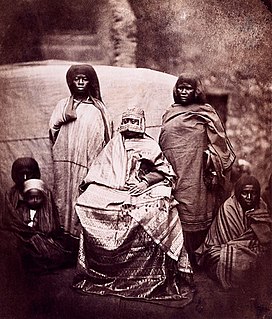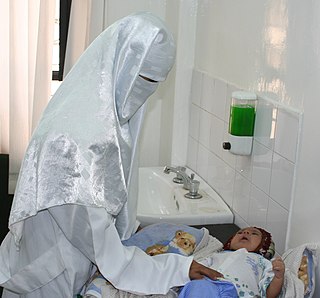
Polygyny is the most common and accepted form of polygamy, entailing the marriage of a man with several women. Most countries that permit polygamy are Muslim-majority countries in which polygyny is the only form permitted.

Child marriage is a formal marriage or an informal union entered into by an individual before reaching a certain age, specified by several global organizations such as UNICEF as minors under the age of 18. The legally prescribed marriageable age in some jurisdictions is below 18 years, especially in the case of girls; and even when the age is set at 18 years, many jurisdictions permit earlier marriage with parental consent or in special circumstances, such as teenage pregnancy. In certain countries, even when the legal marriage age is 18, cultural traditions take priority over legislative law. Child marriage violates the rights of children; it affects both boys and girls, but it is more common among girls. Child marriage has widespread and long term consequences for child brides and grooms. According to several UN agencies, comprehensive sexuality education can prevent such a phenomenon.

Forced marriage is a marriage in which one or more of the parties is married without his or her consent or against his or her will. A forced marriage differs from an arranged marriage, in which both parties presumably consent to the assistance of their parents or a third party such as a matchmaker in choosing a spouse. There is often a continuum of coercion used to compel a marriage, ranging from outright physical violence to subtle psychological pressure. Forced marriage is still practised in various cultures across the world, particularly in parts of South Asia and Africa. Some scholars object to use of the term "forced marriage" because it invokes the consensual legitimating language of marriage for an experience that is precisely the opposite. A variety of alternative terms exist, including "forced conjugal association" and "conjugal slavery".
The type, functions, and characteristics of marriage vary from culture to culture, and can change over time. In general there are two types: civil marriage and religious marriage, and typically marriages employ a combination of both. Marriages between people of differing religions are called interfaith marriages, while marital conversion, a more controversial concept than interfaith marriage, refers to the religious conversion of one partner to the other's religion for sake of satisfying a religious requirement.

The lives of women in China have significantly changed throughout reforms in49)|Republican period]], the Chinese Civil War, and rise of the People's Republic of China, which had announced pnder equality. Efforts the new Communist government made toward gender equality were met with resistance in the historically male-dominated Chinese society, and obstacles continue to stand in the way of women seeking to gain greater equality in China.

Among men who can afford it, the preferred form of marriage appears to be polygyny with matrilocal residence. Although possible, the first marriage is formally initiated with the grand marriage when possible, subsequent unions involve much simpler ceremonies. The result is that a man will establish two or even more households and will alternate residence between them, a reflection, most likely, of the trading origins of the Shirazi elite who maintained wives at different trading posts. Said Mohamed Djohar, elected president in 1990, had two wives, one in Njazidja and the other in Nzwani, an arrangement said to have broadened his appeal to voters. For men, divorce is easy, although by custom a divorced wife retains the family home.

Women's social role in Nigeria differs according to religious and geographic factors. Women's role is primarily understood as mothers, sisters, daughters and wives. Additionally, women's roles are in accordance with ethnic differences and religious background, with women in Northern Nigeria being more likely to be secluded in the home, than women in Southern Nigeria, who participate more in public life. Modern challenges for the women of Nigeria include child marriage and female genital mutilation.
Teen marriage is the union of two adolescents, ranging in age from 13 to 21, who are joined in marriage. Many factors contribute to teen marriage such as love, teen pregnancy, religion, security, wealth, family, peer pressure, arranged marriage, economic and/or political reasons, social advancement, and cultural reasons. Studies have shown that teenage married couples are often less advantageous, may come from broken homes, may have little education, and work low status jobs in comparison with those that marry after adolescence.
While polygyny is legal in the Central African Republic, it has been reported that the more well-educated women living in the nation have tended to oppose it, favoring a monogamous marriage instead. The country's legal code allows a man to take up to four wives, but he must decide on the nature of his future marriages before is allowed to contract his first. In other words, if a man plans to marry one to three more women in the future, he must make this clear: otherwise, he will not be allowed to marry additional women if he later changes his mind.
Polygamy is legal under certain circumstances in South Africa. All polygamous marriages entered into in accordance with the provisions of the Recognition of Customary Marriages Act are legal. The husband in an existing customary marriage wishing to marry a second wife must apply to a competent court for such a marriage to be legal. Hence former President Jacob Zuma currently has four legally-recognised wives. The court considers the interests of all parties to the marriage and may add whatever conditions the court deems just for the polygamous marriage to be valid under customary law. Polygamous marriages are not allowed under the Marriage Act and the Civil Unions Act.
The Mundugumora.k.a.Biwat are a tribe of Papua New Guinea. They live on the Yuat River in the Sepik Region in Papua New Guinea's North West.
Arranged marriage is a type of marital union where the bride and groom are selected by individuals other than the couple themselves, particularly by family members, such as the parents. Depending on culture, a professional matchmaker may be used.

Women in Yemen have historically been placed at a disadvantage due to their sex, with a highly patriarchal society.
Child Marriage in Sudan. In 2017 in Sudan, 34% of girls are married off before the 18 years old. 12% are married before they turn 15. Sudan is the 29th highest nation in the world for child marriage.
Child Marriage in Democratic Republic of the Congo. In 2017 in Democratic Republic of the Congo, 37% of girls are married off before the age of 18. 10% are married before they turn 15. Democratic Republic of the Congo is the 19th highest nation in the world for child marriage.
In 2017 in Uganda, 40% of girls are married off before 18 years old. 10% are married before they turn 15. Uganda is the 16th highest nation in the world for child marriage.
Child Marriage in Ivory Coast. In 2017 in Ivory Coast, 33% of girls are married off before the 18 years old. 10% are married before they turn 15. Ivory Coast is the 30th highest nation in the world for child marriage.
Child Marriage in Niger. In 2017 in Niger, 76% of girls are married off before the 18 years old. 28% are married before they turn 15. Niger is the 1st highest nation in the world for child marriage.
Child Marriage in Burkina Faso. In 2017 in Burkina Faso, 52% of girls are married off before the 18 years old. 10% are married before they turn 15. Burkina Faso is the 5th highest nation in the world for child marriage.
Child Marriage in Sierra Leone. In 2017 in Sierra Leone, 39% of girls are married off before the 18 years old. 13% are married before they turn 15. Sierra Leone is the 18th highest nation in the world for child marriage.








